The main purpose of this ongoing blog will be to track planetary extreme, or record temperatures related to climate change. Any reports I see of ETs will be listed below the main topic of the day. I’ll refer to extreme or record temperatures as ETs (not extraterrestrials).😜
Main Topic: Fatih Birol-Why Everyone Wants to Meet the ‘World’s Most Boring Man’
Dear Diary. Today I will introduce you to a new big player in the world of climate information. He is a Turkish gentleman named Fatih Birol, who has amassed power and influence through the International Energy Agency to help steer policy towards good outcomes.
For more on him here is a New York Times article:
Why Everyone Wants to Meet the ‘World’s Most Boring Man’ – The New York Times
Why Everyone Wants to Meet the ‘World’s Most Boring Man’
Politicians, oil giants and climate activists hang on his every word. The Trump administration has blasted him. How did Fatih Birol get so big?
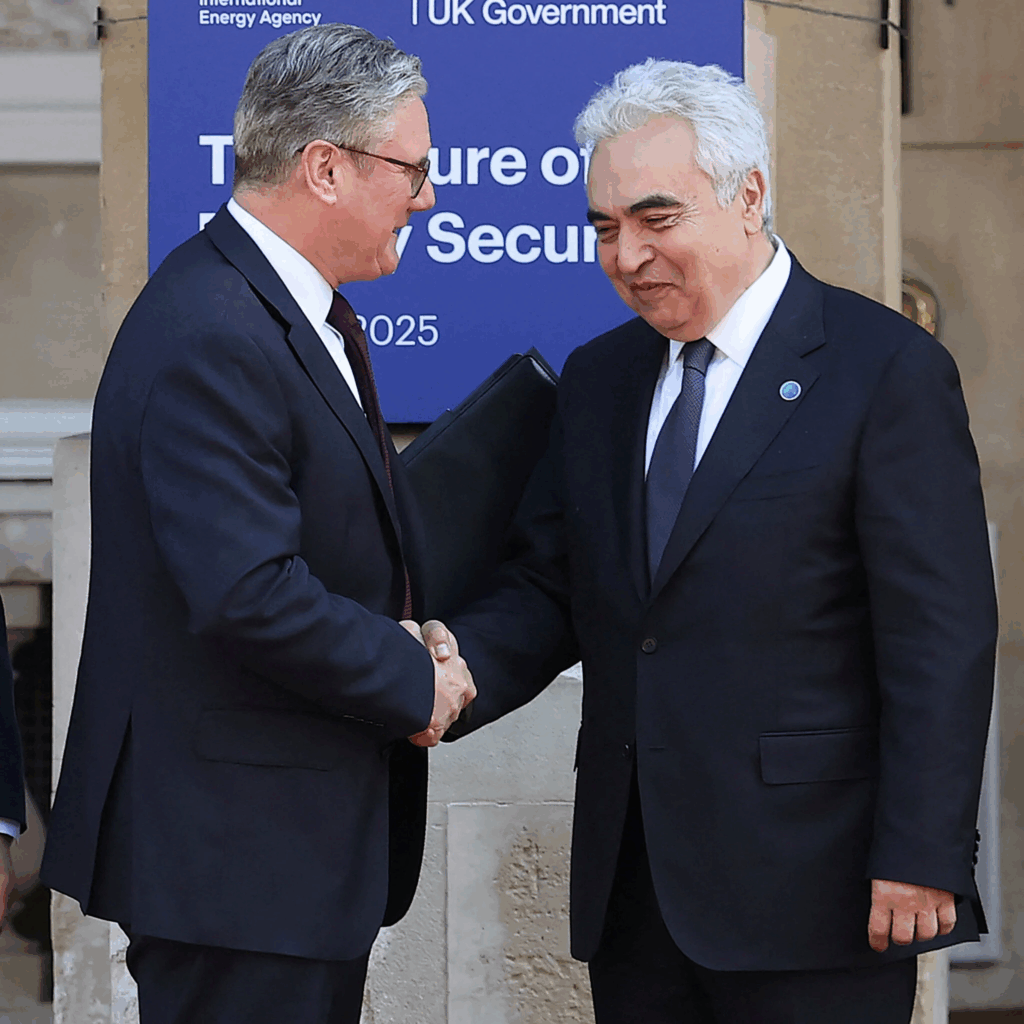
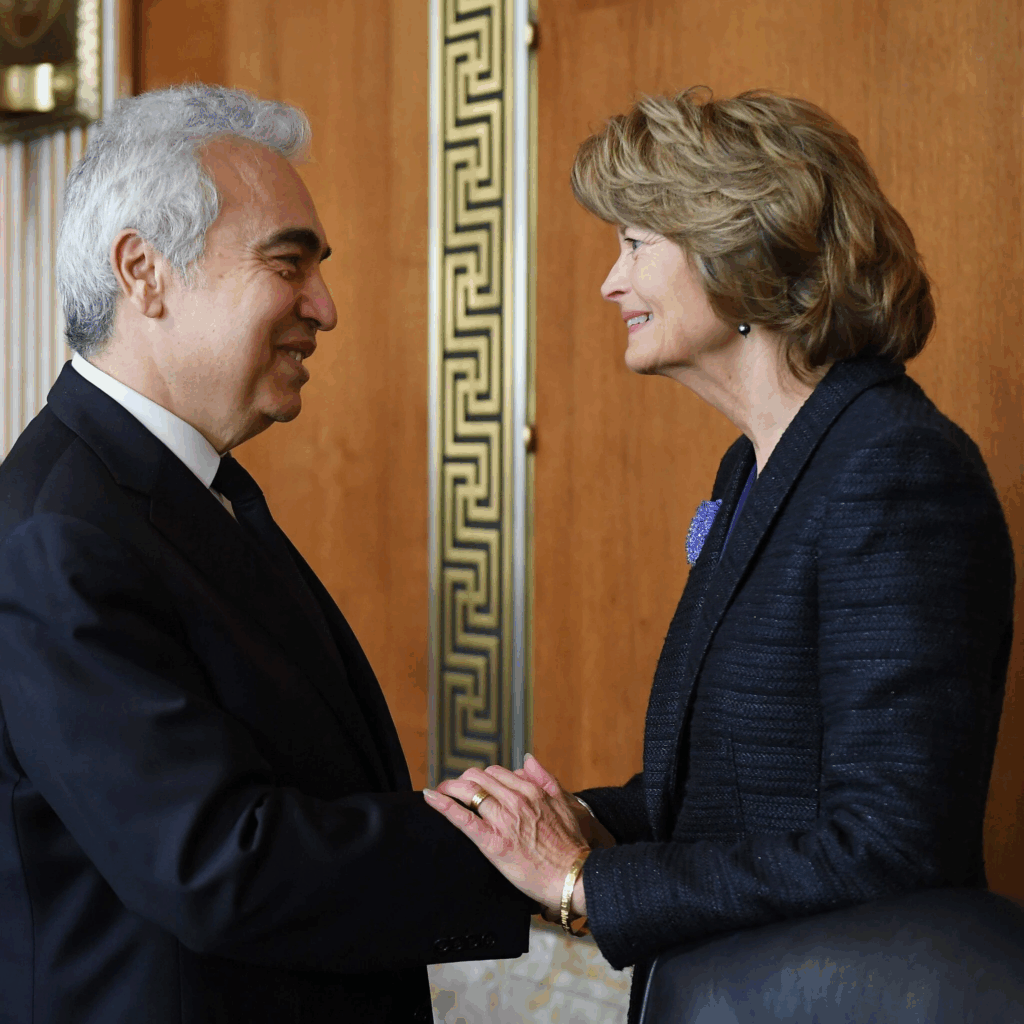

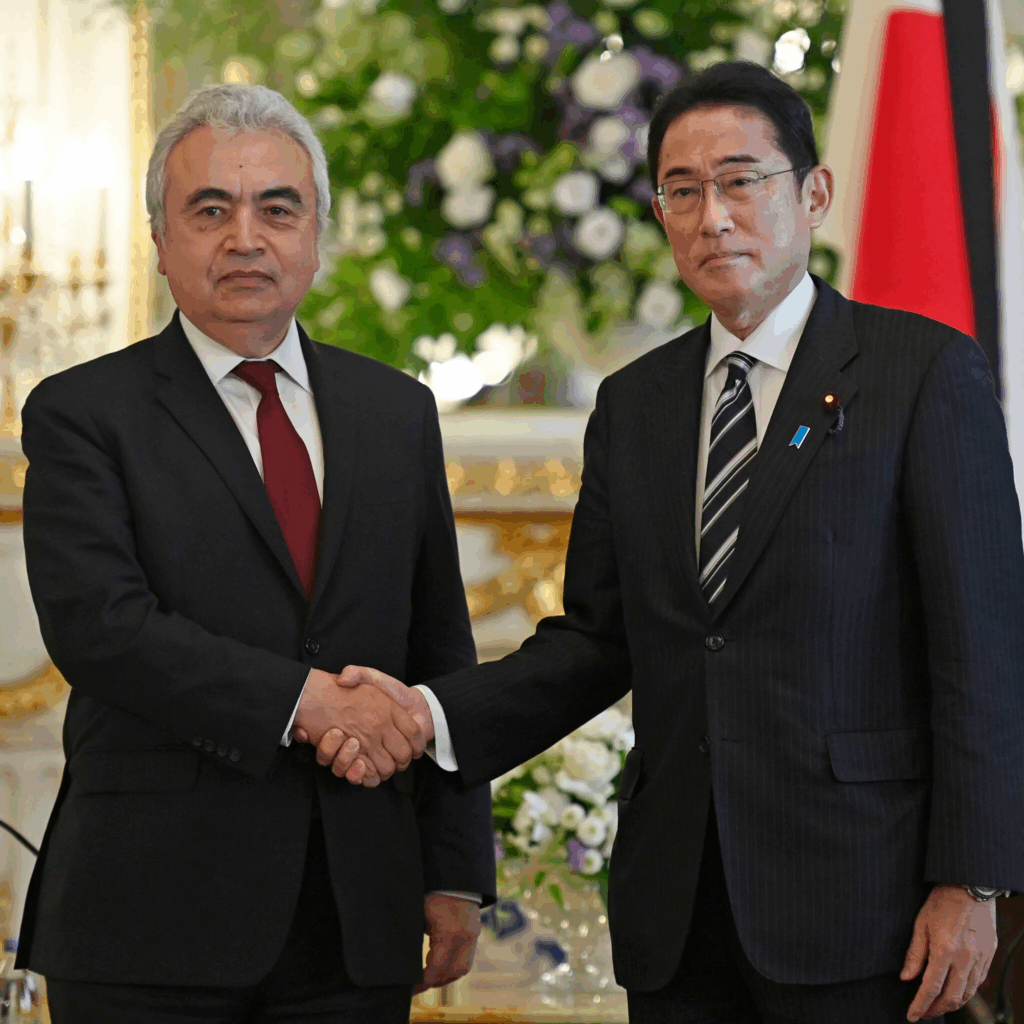
From top to bottom: Fatih Birol with Britain’s prime minister, Keir Starmer; the Alaska Senator Lisa Murkowski; Japan’s former prime minister, Fumio Kishida; and Italy’s prime minister, Giorgia Meloni.
By Max Bearak
Reporting from Washington and New York
Around lunchtime on the day we met, Fatih Birol, a soft-spoken Turkish energy economist, retreated to his hotel room to scarf down two hard-boiled eggs and a banana in front of his computer.
Mr. Birol was, in his typically humble way, preparing for a meeting with potentially far-reaching consequences. The organization that he has led out of obscurity over the past decade, the International Energy Agency, had just come under withering attack by the Trump administration.
He was about to sit down with the U.S. energy secretary, Chris Wright, who had just publicly blasted the I.E.A. as “nonsensical” for predicting that fossil-fuel demand would soon begin to shrink globally. Republicans were threatening to cut the U.S. government’s substantial funding to the I.E.A. if it didn’t change its tune.
The fact that the meeting was held at all shows just how much influence the I.E.A. has gained under Mr. Birol’s tenure. A decade ago, he told me, he probably would have met Mr. Wright’s assistant’s assistant. Now, he was playing a verbal game of tug of war with the U.S. government.
Mr. Birol likes to joke that he is “the world’s most boring man.” He certainly exudes a kind of bureaucratic plainness. But he has also deftly led the I.E.A. through a decade during which energy has re-emerged as a geopolitical weapon. The debate over how to address climate change is upending economic and diplomatic relations around the world — right as the Trump administration works to reverse a global push for a transition to renewable energy by producing, consuming and exporting as much fossil fuel as it can.
Mr. Birol, for his part, has repeatedly offered the fossil fuel industry a kind of “adapt or fail” warning, particularly as solar power grows at a pace that even the I.E.A. underestimated.
Whether one agrees with the I.E.A. or not, its relentless spigot of data-driven reports routinely roils markets, influences billions of dollars of investment and evokes admiration and scorn from politicians, energy executives and climate activists who hang on Mr. Birol’s every word.
More than a dozen countries have bestowed Mr. Birol with state honors. He holds the Japanese First Class Order of the Rising Sun, the highest state honor given to laypeople, as well as the First Class Order of Zayed II, given by the United Arab Emirates in honor of its founder.
Mr. Birol now regularly appears in the photos alongside the world’s most powerful leaders at their ritzy, high-stakes summits.
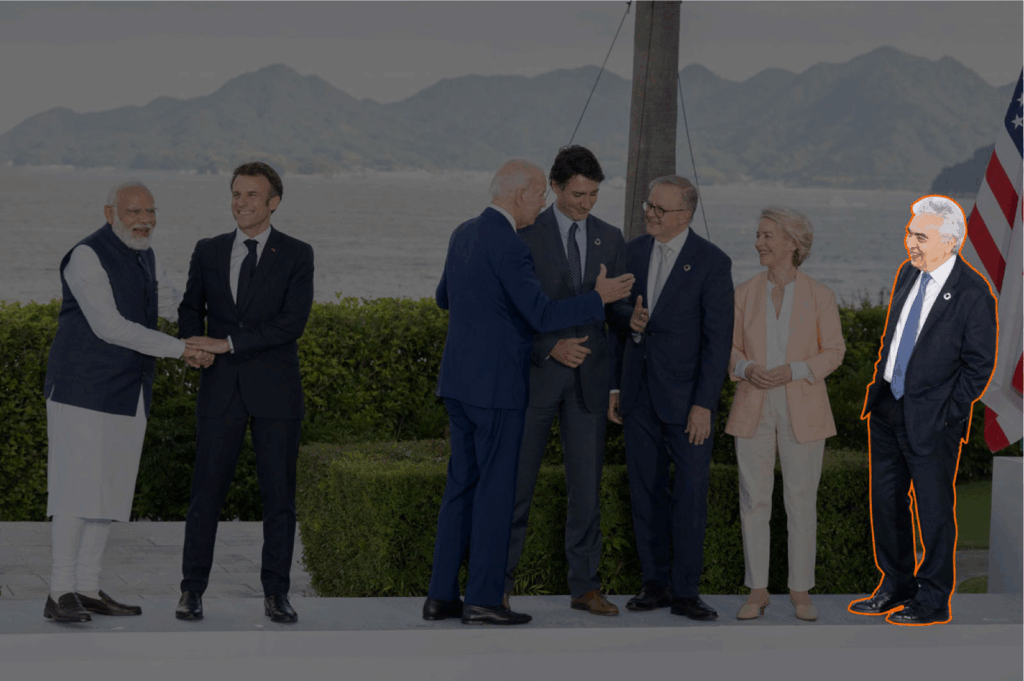
World leaders at the 2023 G7 Leaders’ Summit in Hiroshima. Pool photo by Jacques Witt
“The more important we become, the more people would like us to sing their song,” Mr. Birol said of the attention he gets from people across the political and economic spectrum. “But our song is data. The data always wins.”
And yet, compiling raw data from its dozens of member states is only part of what the I.E.A. does. Under Mr. Birol’s watch, the I.E.A. has become an organization that sketches out different paths that the world could take on energy use, and it offers road maps for how to get there.
The organization’s members, mostly Western countries, have increasingly turned to it for guidance, even if the I.E.A. has occasionally been wrong on some of the biggest questions, like how fast solar power would grow or how quickly coal would decline. Perhaps the biggest question of all — whether or not the world is nearing peak demand for fossil fuels — is one that the I.E.A. has revised its response to numerous times.
That the I.E.A. makes such a prediction at all has created friction between the agency and the Trump administration, which has dismantled nearly all U.S. climate policy. The United States provides around 14 percent of the I.E.A.’s budget. Republicans have accused the agency of publishing “politicized information to support climate policy advocacy.”
A dim view of the I.E.A. is shared by many in the fossil fuel industry. The head of OPEC, the oil-producing bloc, said this year that the I.E.A. had an “anti-oil narrative” and that its road maps were “unrealistic.”
But Mr. Birol says he is not telling anyone what to do, just what is most likely to happen. And for now, he has persuaded Washington to withhold punishment. Meanwhile, the organization is poised to welcome two new members who are major energy players: India and Brazil.
India’s ambassador to France between 2020 and 2024, Jawed Ashraf, who knows Mr. Birol well, said that the I.E.A.’s forecasts were particularly important for countries trying to balance economic growth with their pledges to reduce the emissions of greenhouse gases.
“What Fatih has done is brought to bear the full weight of data-gathering and modeling at a granular level, which actually gives a clear idea about the kind of effort that will be needed to attain climate goals,” Mr. Ashraf said. “That’s more relevant than the United Nations climate negotiations in some ways. The I.E.A. informs them, rather than the other way around.”
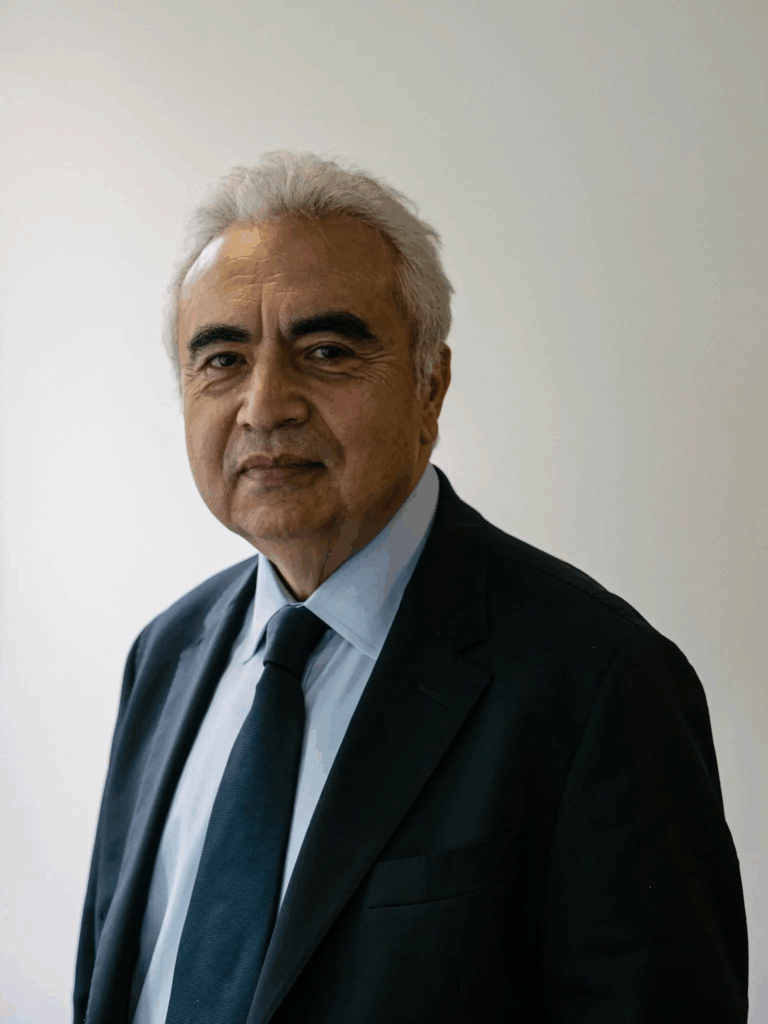
Fatih Birol Credit…Caroline Gutman for The New York Times
The International Energy Agency was created by Henry Kissinger, then secretary of state, in the 1970s at a time when climate change was not part of the political lexicon. The agency’s original mandate was to monitor global oil supplies and help countries coordinate to prevent energy-price shocks. In 1973, a group of Arab oil producers had blocked exports of oil to the United States and others to protest their support for Israel. That sent prices soaring and led to fuel shortages and a period of economic malaise that came to be known as “stagflation.”
Mr. Birol was a young film student in Vienna when the I.E.A. was in its infancy. He had a penchant for surrealism. Only one cinematic work of his remains, he said. It was shot on eight-millimeter film, is 18 minutes long and was titled “A Lyrical Love Murder.” The film features no dialogue, its soundtrack being Tchaikovsky’s lugubrious Symphony No. 6 in B minor. “Not a happy story,” Mr. Birol said.
But he had married at 18 and had a child at 19 and film wasn’t paying the bills. He switched to energy economics and got a side job at a produce market. After graduating, he became a number cruncher at OPEC.
He shifted to the I.E.A. and had worked his way up for two decades by the time he was elected executive director in 2015. Alternative energy sources like solar, wind and fracked natural gas were on the cusp of significant growth. The agency expanded its focus from oil to include analysis on how they might power vehicles, data centers and heavy industry. Climate change began to emerge as a hot-button political issue as the science linking its causes to greenhouse gas emissions became clearer.
Soon after he took charge, Mr. Birol engineered a major change in how the organization would predict the future. Previously, the agency had predicted only what would happen to global fossil fuel demand if countries simply stayed their current course. Those reports generally implied long-term growth in fossil fuels.
But in 2020, the agency replaced that scenario with one that took into account policies that countries were most likely to enact, based largely on their promises to cut emissions as part of global climate negotiations. At the time, Mr. Birol said it offered a more realistic picture of the world’s energy future. But it also signified the beginning of a rift between the I.E.A. and many fossil fuel proponents.
The I.E.A. also issued a so-called net zero scenario, which, rather than simply projecting the future, laid out 400 milestones the world could hit on its way to fully stop adding greenhouse gases to the atmosphere by 2050.
One milestone was the elimination of all investments in new coal, oil and gas fields. That became a mantra for climate activists, though Mr. Birol later clarified that the I.E.A. was not prescribing a course of action but merely saying that it would eventually happen as the world worked toward net zero emissions of greenhouse gases.
Even as the I.E.A.’s work has attracted more attention and criticism, Mr. Birol has remained popular. He was unanimously elected by the organization’s member states to a third four-year term that will end in 2027. And the agency itself has doubled in size under his leadership. Mr. Birol beamed recalling how more than 1,000 people had recently applied for an entry-level position similar to the one he had in the 1990s.
This year, amid pressure from Washington, the I.E.A. is bringing back its original “current policies scenario” to accompany the others. That annual report, the World Energy Outlook, will publish later this week.
But as is often the case when trying to make everyone happy, everyone may end up upset instead. “I am here to make people think about the future — like, really, really imagine it, which is very difficult,” he said. “Climate change is a good example of that. People only pay attention when there is a catastrophe. But we need a plan for it.”
Photo credits for top grid, clockwise from top left:
Pool photo by Toby Melville; Mandel Ngan/Agence France-Presse — Getty Images; Pool photo by David Mareuil; Andreas Solaro/Agence France-Presse — Getty Images
A correction was made on
Nov. 10, 2025
An earlier version of this article misidentified an award presented to Mr. Birol by the United Arab Emirates. It was the First Class Order of Zayed II, not the Order of Zayed, and as such did not include a necklace made up of engraved gold rings.
Max Bearak is a Times reporter who writes about global energy and climate policies and new approaches to reducing greenhouse gas emissions.
Here are some “ET’s” recorded from around the planet the last couple of days, their consequences, and some extreme temperature outlooks, as well as any extreme precipitation reports
Here is More Climate News from Monday:
(As usual, this will be a fluid post in which more information gets added during the day as it crosses my radar, crediting all who have put it on-line. Items will be archived on this site for posterity. In most instances click on the pictures of each tweet to see each article. The most noteworthy items will be listed first.)